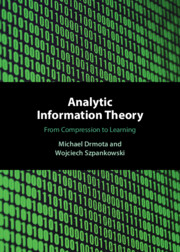
-
Select format
-
- Publisher:
- Cambridge University Press
- Publication date:
- August 2023
- September 2023
- ISBN:
- 9781108565462
- 9781108474443
- Dimensions:
- (254 x 178 mm)
- Weight & Pages:
- 0.904kg, 380 Pages
- Dimensions:
- Weight & Pages:
You may already have access via personal or institutional login
Book description
Through information theory, problems of communication and compression can be precisely modeled, formulated, and analyzed, and this information can be transformed by means of algorithms. Also, learning can be viewed as compression with side information. Aimed at students and researchers, this book addresses data compression and redundancy within existing methods and central topics in theoretical data compression, demonstrating how to use tools from analytic combinatorics to discover and analyze precise behavior of source codes. It shows that to present better learnable or extractable information in its shortest description, one must understand what the information is, and then algorithmically extract it in its most compact form via an efficient compression algorithm. Part I covers fixed-to-variable codes such as Shannon and Huffman codes, variable-to-fixed codes such as Tunstall and Khodak codes, and variable-to-variable Khodak codes for known sources. Part II discusses universal source coding for memoryless, Markov, and renewal sources.
Reviews
‘Drmota & Szpankowski's book presents an exciting and very timely review of the theory of lossless data compression, from one of the modern points of view. Their development draws interesting connections with learning theory, and it is based on a collection of powerful analytical techniques.’
Ioannis Kontoyiannis - University of Cambridge
‘Drmota and Szpankowski, leading experts in the mathematical analysis of discrete structures, present here a compelling treatment unifying modern and classical results in information theory and analytic combinatorics. This book is certain to be a standard reference for years to come.’
Robert Sedgewick - Princeton University
Contents
Metrics
Full text views
Full text views help Loading metrics...
Loading metrics...
* Views captured on Cambridge Core between #date#. This data will be updated every 24 hours.
Usage data cannot currently be displayed.
Accessibility standard: Unknown
Why this information is here
This section outlines the accessibility features of this content - including support for screen readers, full keyboard navigation and high-contrast display options. This may not be relevant for you.
Accessibility Information
Accessibility compliance for the PDF of this book is currently unknown and may be updated in the future.


